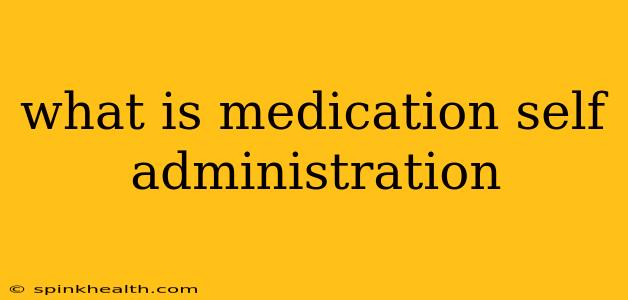Medication self-administration—it's a phrase that might sound clinical, but it represents a fundamental aspect of healthcare, particularly for individuals managing chronic conditions or recovering from illness. At its core, it's the act of a person taking their own prescribed medication, as opposed to having someone else administer it. This simple act, however, encompasses a complex interplay of factors, including responsibility, safety, and effective healthcare management. Let's delve into this crucial topic.
Imagine Sarah, a 60-year-old woman living with type 2 diabetes. Every morning, she meticulously checks her blood sugar levels and then takes her prescribed insulin. This routine act is medication self-administration. It’s a vital part of her managing her condition, keeping her healthy, and preventing serious complications.
But Sarah's story is just one example. Medication self-administration extends far beyond diabetes management. It applies to individuals of all ages and health conditions, from children learning to use an inhaler for asthma to elderly adults managing multiple medications for various health issues.
Why is Medication Self-Administration Important?
Medication self-administration empowers individuals to take control of their health. It fosters independence, allowing people to actively participate in their care, rather than being completely reliant on others. This active role can lead to better adherence to treatment plans, improved health outcomes, and a greater sense of personal agency.
This empowerment, however, is not without its challenges. Safe and effective medication self-administration requires a certain level of cognitive function, dexterity, and understanding of the medication's purpose, dosage, and potential side effects.
Who Might Need Medication Self-Administration Support?
Not everyone can safely and effectively manage their medications independently. Certain factors can impact a person's ability to self-administer medication, such as:
- Cognitive impairment: Individuals with dementia, Alzheimer's disease, or other cognitive impairments may struggle to remember to take their medication or understand the instructions.
- Physical limitations: Difficulty with fine motor skills, vision problems, or arthritis can make it challenging to open pill bottles or use inhalers.
- Mental health conditions: Individuals experiencing depression or anxiety may struggle with medication adherence.
- Young children: Children require supervision and assistance with medication administration until they develop the necessary cognitive and physical skills.
How is Medication Self-Administration Supported?
For those who need support, several strategies can ensure safe and effective medication self-administration:
- Medication organizers: These devices help individuals organize their pills by day and time, making it easier to remember to take them.
- Medication reminders: Smartphone apps, alarm clocks, or caregivers can provide reminders to take medication.
- Caregivers: Family members, friends, or professional caregivers can assist individuals with medication administration.
- Educational resources: Doctors, nurses, and pharmacists provide instruction and guidance on how to take medication correctly.
What are the potential risks of Medication Self-Administration?
While medication self-administration is generally safe and effective, there are potential risks:
- Medication errors: Taking the wrong dose, taking the medication at the wrong time, or taking the wrong medication can have serious consequences.
- Non-adherence: Failing to take medication as prescribed can lead to ineffective treatment and worsening of the health condition.
- Adverse drug events: Unexpected or unwanted side effects can occur, requiring medical attention.
How can I ensure safe medication self-administration?
Safe medication self-administration involves several key steps:
- Understanding your medication: Ask your doctor or pharmacist to clearly explain your medication, its purpose, dosage, and potential side effects.
- Using a medication organizer: This can help you stay organized and avoid missing doses.
- Reading the medication label carefully: Always double-check the label to ensure you are taking the correct medication and dose.
- Keeping your medications in a safe place: Store your medications out of reach of children and pets.
- Reporting any side effects to your doctor or pharmacist: It's crucial to report any unusual or concerning symptoms.
Medication self-administration is a vital component of healthcare management. While it empowers individuals, careful planning, understanding, and sometimes support, are crucial for safe and effective results. Open communication with healthcare professionals is key to ensuring that individuals have the knowledge and resources they need to manage their medications responsibly.

